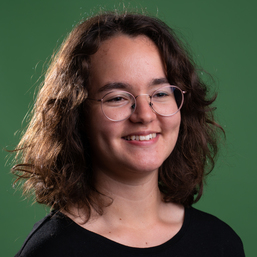.jpg)
UvA Buildings | Occupy Academic Club: “In an ideal world, I wouldn’t be an activist”
Political science student Zep van de Visse (22) was one of the occupiers of the former Academic Club on the 16th of January. In part two of the two-part feature of the building that once housed the Binnengasthuis pharmacy, a conversation with an activist who doesn’t want to be an activist. “We wanted to make it clear that it was a peaceful protest.”
“I have been involved with UvA Rebellion since early 2022. Before that, I was active with the UvA Green Office, but although that organization is well-meaning, I found it to be more like the Uva Greenwashing Office,” Zep van de Visse explains with some irony. That’s why he joined the smaller actions of UvA Rebellion. He started climate activism earlier: in 2019, he joined a school strike protesting for the climate. He chose his studies in political science “partly to learn how politics works” and to learn how to positively change the system from within. “But during my studies I found out that that is not always possible. That’s why I try to use activism to put pressure on the system from the outside as well.” He helped organize the march against Shell on January 16 and the occupation of the former Academic Club. “Nowhere did it say that the building was being used. That’s why we chose it.”

Zep, how did the occupation go?
“First we marched against Shell; some people had already occupied the building. With the students from the march, we went to protest in front of the building and tried to make it clear that it was a peaceful demonstration. Around three o’clock in the afternoon, it became clear that there were no police yet and negotiations with the CvB began. Then we opened the building. Students could enter the room and talk to each other about the climate crisis and the role of big oil companies. Around five o’clock we got a tip that the police were on their way. Then everyone who didn’t want to be in the building during the evacuation was given time to leave.”
What was your role?
“For security and privacy reasons of myself and others, I will leave open what my role was. When the police arrived, several climate activists stood arm in arm. The police yelled for them to leave, but they kept on chanting as an expression that they were engaged in a peaceful protest. They were then beaten away with batons and a police van drove into the crowd. I saw a cop with his knee on someone’s neck. I was not surprised by the eviction. Nor did I expect that our demands would be met. They weren’t.”
One of the demands you had with the occupation was to create an autonomous discussion area within the UvA. Why is that necessary?
“Internal democracy within the UvA is weak, we observed. The student council has too little power. In 2015, students occupied the Maagdenhuis for a few weeks and pleaded for more democracy and transparency within the UvA. The university accommodated the students then, but in practice, we see that the students still have little power. For example, the entire central student council is against the UvA’s collaboration with Shell, but the Executive Board (CvB) goes ahead with it anyway. Then you see that the CvB has veto power. That’s why one of our demands in the occupation was to create an autonomous place where that discussion is possible.”
Why did you choose the former Academic Club to hold these kinds of discussions?
“Because to our knowledge, the building was vacant and it’s a UvA building in the University Quarter. Since our coalition consists of student movements, mostly consisting of UvA students, the choice of this location was also practical.”
What do you mean by autonomous?
“We want there to be a place where students can freely talk about decolonization, democracy, and stopping the UvA’s use of fossil resources. For example, if you stand on one of the UvA campuses handing out flyers, within two minutes security guards come up to you and tell you that this is not allowed, even if it is an important topic. We also feel that not enough lectures are given on issues such as climate change and that there is not enough freedom to discuss them.”
Do you notice that other students also need such a place for discussion?
“If we stand somewhere with a banner of UvA Rebellion, for example, students often respond positively to that. Certainly, students of social sciences and climate sciences understand very well what we stand for. But I think for many students the threshold is very high to join us.”
What kind of discussions should we then consider?
“To give an example: I study political science. There we learn how academia works. That’s very good, but everything stays within a certain rigid scientific paradigm.”
What do you mean by a “rigid scientific paradigm”?
“We have to go to a different system because the climate crisis can only be solved if we act on the scientific facts. You also must understand ethics. For example, we know from the facts that it is problematic if the Earth warms a degree and a half or more. Global warming is already affecting people who live in areas that flood quickly. To understand that, you also have to talk to the victims of the climate crisis.
Do you see yourself as a climate activist?
“If something is not done now against global warming, a lot of people will suffer. In an ideal world, I wouldn’t be an activist, but I am now. In this world, the lives of future generations are threatened.”

.jpg)
